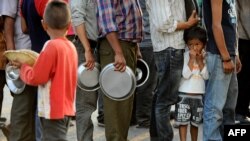U.S. Congressmen are looking at Nepal's recovery needs after the earthquake that claimed some 8,600 lives last month. Members of a foreign affairs subcommittee had high praise Wednesday for the U.S. government’s rapid response, but also looked at the challenges ahead for the people of Nepal and the international community.
Republican and Democratic members of the committee agreed the U.S. government response to the deadly earthquake April 25 made a significant difference, saving the lives of many in Nepal.
Despite those efforts and the efforts of others, though, panel chairman Matt Salmon, a Republican, said the crisis for Nepal is far from over.
“’Monsoon season is fast approaching. Large numbers of homeless people exposed to the elements during this time would be a dire enough problem in and of itself,” he said.
Salmon said the earthquake and after-quakes also hurt Nepal’s water supply and sanitation system, and will threaten the food supply if people are unable to plant crops.
State Department Assistant Secretary Nisha Biswal was on the scene to assess how the United States can help.
“Last week I traveled to Nepal and witnessed first-hand the devastating losses suffered by the Nepalese people, but also the triumph of the human spirit, the resiliency of the affected communities and the courage and the commitment of the relief workers as they all came together to help Nepal to recover from this devastating earthquake,” said Biswal.
Biswal said the U.S. is currently providing large quantities of strong plastic sheeting to build temporary housing, as well as temporary schools and play areas.
Jonathan Stivers of the U.S. Agency for International Development said the U.S. is aware women and children are the most vulnerable.
“Prior to the earthquake, human trafficking was a prevalent problem. And the current disaster puts women and girls at great risk," said Stivers. "USAID is leveraging its anti-human trafficking program to respond to these heightened protection needs.”
The United States is the longest-standing development partner with Nepal, since 1951, and has provided $47 million to date in the wake of the April earthquake.









